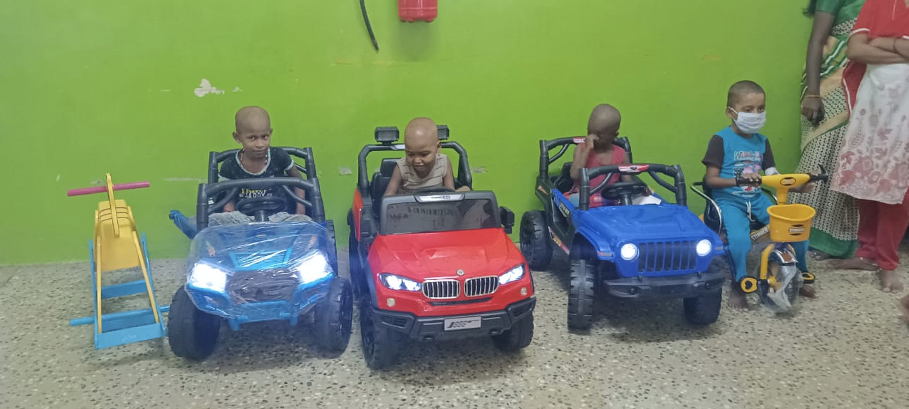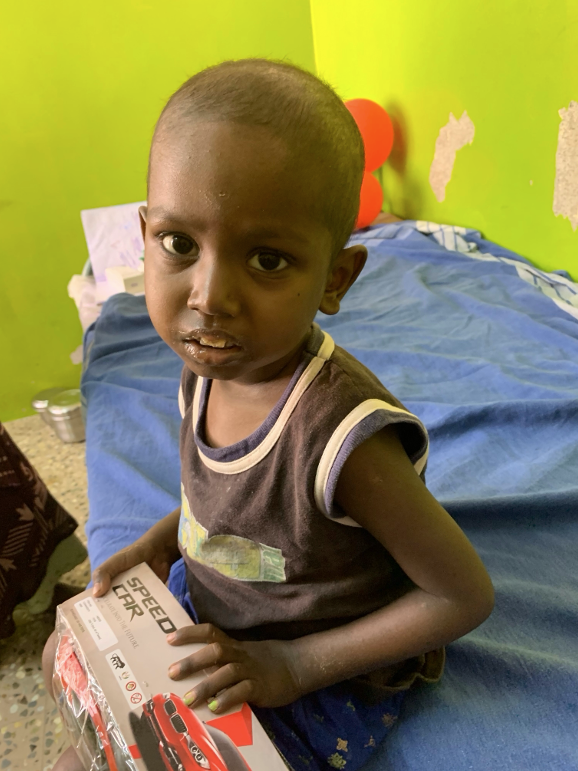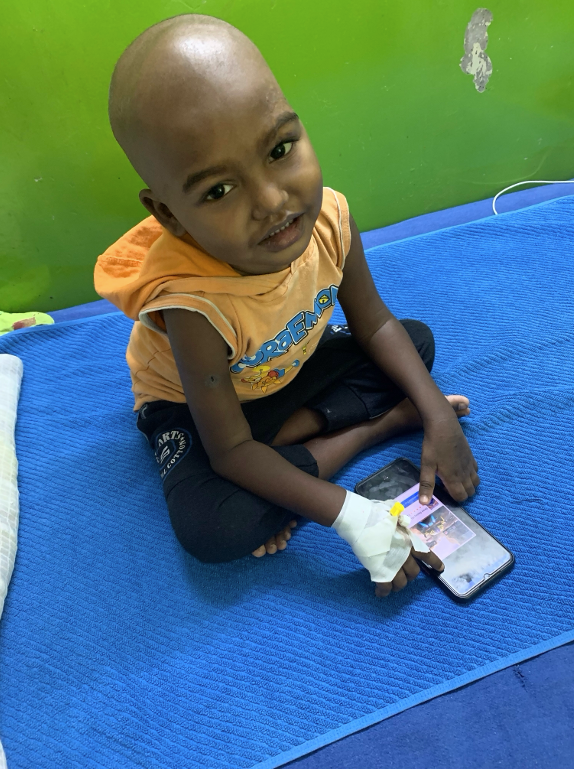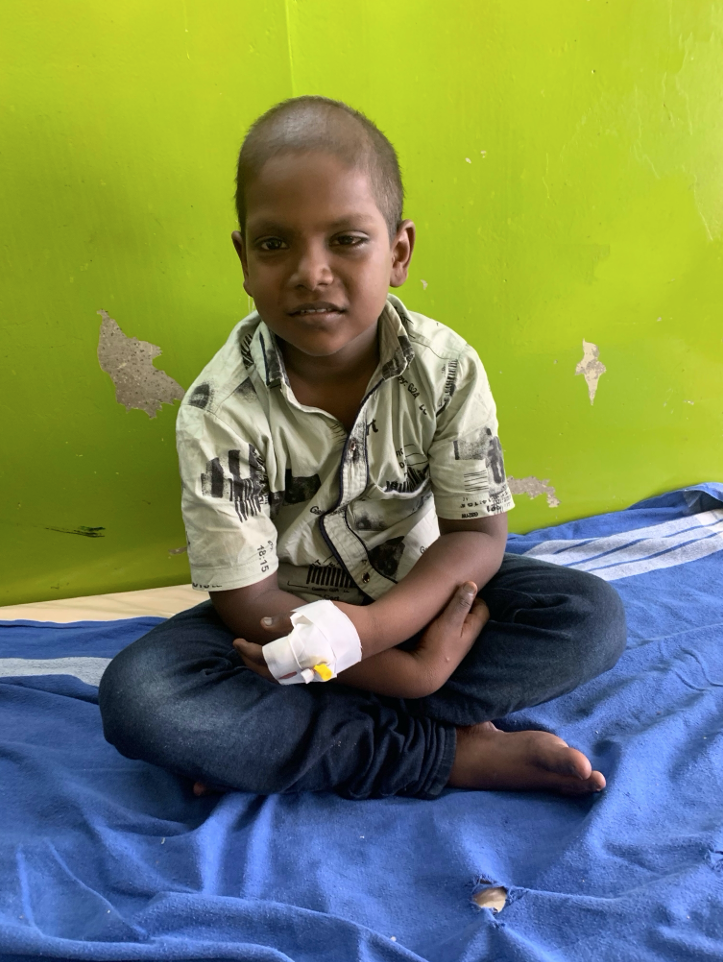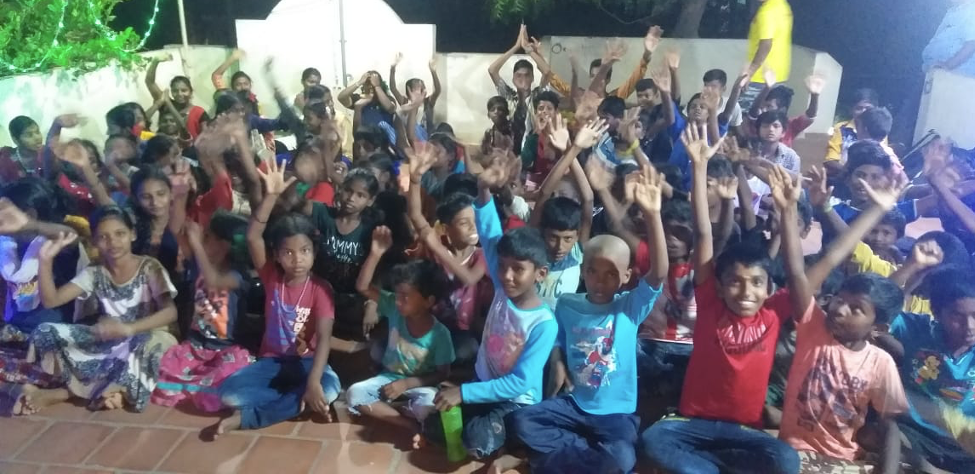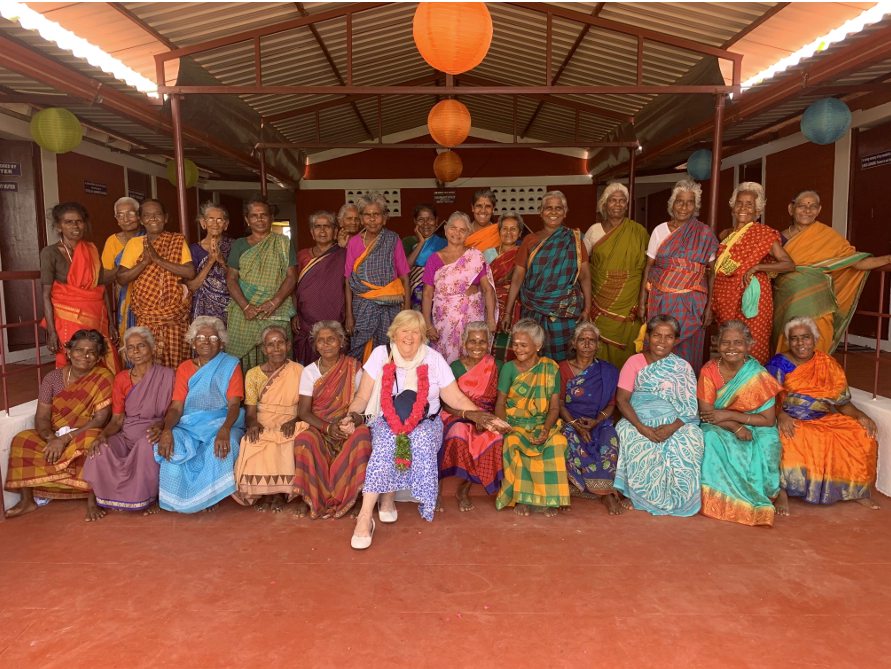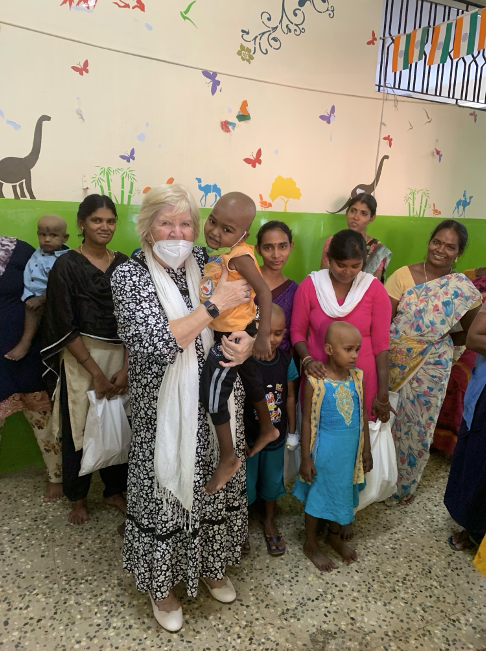Dear Friends,
Well, after two and a half years I have finally been able to get back to our projects, just a short visit but long enough to observe progress and to encourage and thank our wonderful staff for their incredible efforts over such a difficult time.
I can confirm that throughout the pandemic we continued with hot meal delivery for all our slum elders, delivered monthly supplies to the leprosy colony and provided support to the paediatric unit at the local hospital. This was essential. Lockdown restrictions meant that parents were unable to go outside to buy food for their children. We provided a daily food bag of fruits, biscuits, multi vitamins and other items. The hospital did provide one meal every day, a watery dhal, not enough for a child with cancer. Equally important was our provision of water coolers and replenishing them daily with clean filtered water. We also provided hand sanitisers, masks and gloves, none of which were provided by this hospital in a poor area. Transportation and provision of some needed but unavailable medicines were also priorities.
Our slum sponsored children were also supported with regular food supplies and as possible educational help.
It was very difficult for the children and the slum community. Being confined to a shack around 8 by 10 with no electricity, water supply or toilet for several hours daily over many months took its toll on all the people. The very strict lockdown undoubtedly saved lives but it doesn’t take much imagination to realise how hard it must have been. Our staff were given dispensation to deliver essential things like food and water and did so throughout the pandemic period. Although we provided PPE for the staff they all contracted the virus but thank God survived.
Our residential elders had been moved to a home in a remote village as we saw the pandemic increasing. They were safe there and we continue to support them. In the meantime our shelter home building was used on a temporary lease by another charity, the monies raised from that rental covering many of the additional costs with the cancer hospital.
I will just add a reminder that our city is drought affected and poor with many slums, progress or development of the slums is difficult when there is no water for drinking, without regular filling of water tanks, and of course no water means no sewage movement.
Our years of development and work experience allowed us to operate outside of many of the restrictions with our long term reputation with the local dignitaries being important.
So, an update on the children with cancer.
It was a real joy to spend time on the paediatric oncology unit with the dedicated staff. Currently we support 16 in patient children and another 20+ still undergoing treatment at home. They are in individual rooms which are much improved after our deep clean and decoration of the unit. Some of the children are very sick and need isolation, but others have little in the way of stimulation as they undergo treatment. The rooms are either side of a long corridor so I had an idea! A trip to a local shopping area led to the purchase of a battery car. The faces of the children when they saw it had me in tears. Suddenly the corridor was full, interaction began and great delight as they took it in turns to ride. One in to sixteen means queues, so we got another two cars!
This plus a couple of other play toys made for wonderful afternoon. The parents were keen also to express thanks for the essential food we have provided.
The Slum
I arrived at our slum in the dark so difficult to take photos but it was wonderful to see all of our ladies who never seem to complain, we were to meet at the shelter home the next day. The younger children were in our small hut lit by a generator for their classes, again great exuberance! We continue to provide tuition and care for over a hundred children in 2 locations. I met the older children the next day as they assembled on the rooftop of our office building. The older children frequently go on to degree courses, something beyond their dreams a few years ago, our graduates number well in to the hundreds now thanks to their hard work, our excellent teachers and staff and the strong desire to do well for their sponsors.
Shelter and slum elders
We had a lovely lunch together in the shelter home when saris were given to each lady plus a lavender bag (Norfolk lavender of course) made by Jenny one of our sponsors. This was followed by lunch. That the pandemic was difficult for them was apparent but they expressed their gratitude for the daily hot meals and contact. Four ladies died but we are unsure of the reason, largely the slum was not affected by the virus. The strict lockdown though difficult beyond, what we experienced here, saved lives.
Four new ladies joined the group at that lunch, bringing our slum elders back to 52.
Leprosy Colony
We have supported this colony for 7 years now. As they are always isolated the virus did not affect them but sadly 3 of our friends did die, life expectancy is short in the colony due to physical effects of the disease - not just the obvious disfigurements but also heart issues, constant chest infections and compromised immune systems affect the individuals.
As we do every month we delivered supplies for each family of rice, fruits, bandages, antiseptics and vitamins.
So now we come to a major piece of news.
Mavelikara
The Trust has been working for almost 33 years now and the early part of the work was in starting a boys, then girls, homes. These worked well in rented buildings in the Trivandrum area. Our work in Madurai (intially in conjunction with another charity) developed, changing with the decision to work there independently through the registration of a new Trust.
The rented buildings in Trivandrum district were not of the standard we wanted so fundraising began with a view to building our own homes.
Then came the devastating Tsunami of 2004. I went to India 3 days after the event as it had impacted our work in Tamil Nadu, experiencing scenes there I still find it hard to speak about.
In the Trivandrum area the tsunami effect was much less severe but had an impact on our home children, most of whom were from the coastal areas. These areas on the west coast saw less loss of life but severe impact on the paddy fields that were saturated with salt water. Over 700,000 acres were unable to be cultivated. For the paddy workers who lived from field to field as they harvested there was now no work. As a result many of the men went to other areas to find work leaving wives and children. It was possible for women to find work often as housemaids, but children were not accepted. So many children were living outside compound walls while their mother’s worked.
Land and building costs were much cheaper in that area so with money we had already raised plus being recipients of the Norwich Diocesan Lent project, we were in a position to buy some land and put up 3 buildings, a boys home, girls home and dining block.
Please note as I had registered the new Trust as Settlor the complex ownership was secure with us (these days this would not be allowed.)
So we were able to eventually move our children from the city area and to take many of the Tsunami affected children in to our care. It wasn’t easy, makeshift huts and even a cow shed were used for classrooms and accommodation as the buildings were raised, but eventually the Bishop of South Kerala opened our homes. We had by then over 60 sponsored children.
Everything progressed well along with our parallel work in Tamil Nadu for several years but gradually the need for the residential homes became less. We moved on to being a tuition/residential centre but even that after a while was not so needed. Our remaining children could be sponsored at home (better than residential care). Therefore by 2017, we were looking for alternative uses for the building as the numbers of children needing help decreased. Then came 2019 and COVID. Travel to India was not permitted and lockdown meant that our buildings were not in use.
The past 2/3 years have been difficult. New trustees were appointed and as the restrictions were lifted we were able to clean, paint and where necessary renovate the buildings. Lifting of visa restrictions have enabled me to return and now we look to the future of the buildings and operation.
Dining block
The buildings are being used. A recently appointed social worker has started soap making and self help groups for local women. A Skills training unit used one of the buildings for a year. We see a real need for the main area of our work to be with a local children's cancer unit (and the need for support there mirrors that of our Madurai work), but it does not need the number of buildings we have available.
Initially the plan was to have a respite centre for children from the local area and our Madurai hospital so that there was a clean and safe place available following bone marrow transplants and other surgeries as many of the children would be going home to rural and city slums. This idea had to be shelved because of infection risks and concerns about being away from hospitals. We have however been able to offer accommodation to some sick children - for example recently a mother whose newborn had heart surgery would have taken that child home to a fishing community shack. This sort of help however does not need a complex as big as ours and it makes sense to realise the value and release funds.
You will understand that in a short visit it was difficult to make definite decisions but after 32 years of working in India I can see that releasing capital by selling part or all of the complex will push us towards the long held dream of self sufficiency.
I have discussed the options with our trustees and advocate (solicitor). Selling all or at least part of the complex is almost certainly going to be the pathway.
The buildings have increased substantially in value and could secure the long term future of the Trust. This will take up to a year but will eventually enable a scaled down but efficient and largely self sufficient operation across all of our work.
So I need to go back (probably after Christmas) and then final decisions will be made.
Muthukumar will act on my behalf in the meantime as we plan and pray for the right decisions that will affect the future of our dependant people and our mission.
It is perhaps pertinent at this point to explain again the lives of the people we help. They are all part of the Dalit (Untouchable) communities living in city or rural slums. In Madurai our community lives in a large slum with no water, toilets or electricity. Most will live in rudimentary shacks and are reliant on government deliveries of water in this drought affected area. The local hospital helping children with cancer does it’s best with dedicated staff, but many children would not even reach hospital without our help and could not afford post treatment medications that are essential for recovery. Our ambulances have been invaluable. Average income of those we help will be less than £20 weekly.
In Kerala it is different. Drought and lack of water are not issus and the influx of Gulf money has widened the gap between the very well off and those in rural and fishing communities. Flooding is regular and those we help will be living in very poor slum like conditions. Children with cancer will face the same problems as those in Madurai. I can say with absolute assurance that many children in both areas have been only had life saving treatment because of our intervention.
After 32 years of project set up and development I can of course, see wonderful improvements in the infrastructure and progress in India. Perhaps in another 10 years or so our help will not be needed but we are at the coal face now. Along with this is the fact that our reputation has been developed by refusing to be involved in corruption, we have respect and co-operation from authority figures and the hospitals where our work has developed. Our carefully maintained assets can help to continue that work.
Key also are our staff. I cannot praise Muthukumar enough, he has worked so hard over so many years and hopefully our assets will enable this to continue.
You, our sponsors, have enabled all of this to happen.
We have maintained our promise of sending all donated funds for our work and have utilised those funds to help those in greatest need. We don’t have offices or advertising campaigns but have been deeply indebted to all of you who have kept our projects alive. Many hundreds of lives have been saved or changed. I wish that you could see the results of your support.
So, we plan, try to find the right path and continue to commit ourselves to the wonderful people we serve.
Thank you all very much.
